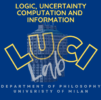Logic Group at ISIPTA 2021
We are happy to announce that our three papers P. Baldi and H. Hosni, Logical Approximations of Qualitative Probability. A. Termine, A. Antonucci, A. Facchini and G. Primiero, Robust Model Checking with Imprecise Markov Reward Models. E. A. Corsi, T. Flaminio and H. HosniWhen Belief Functions and Lower Probabilities are Indistinguishable. are now available online […]
